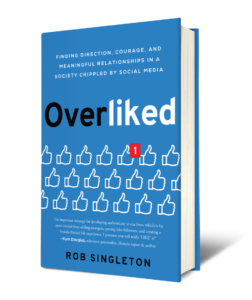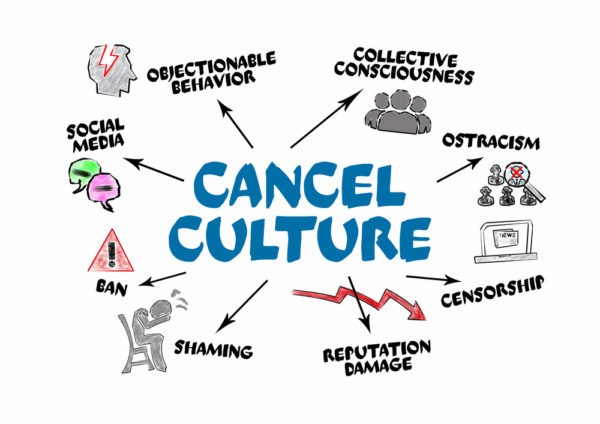Cancel culture. We hear so much about it these days—I wrote a blog about it a few months ago—but did you know it actually goes back a little ways?
When these cancel culture incidents first started happening years ago, you could usually shame the accusers back into whatever safe space they crawled out of. Their attempts to bring people down for shallow reasons or vengeance or whatever were so obvious and ridiculous. But then, bringing people down for any reason became all the rage. Those pushing cancel culture today know no shame, so you can’t shame them anymore. Cancer culture has run amok now and threatens to undo the victims and protect the not-so-innocent who wield it as a weapon.
The Origin of Cancel Culture
It’s a very dangerous place we find ourselves in society today. Believe it or not, though it’s been with us a long time, and certain foundational elements of it are actually good for any society. A recent New York Times article on the origins of modern-day cancel culture shared that, in the early 21st century, a decade into the experiment of the public Internet (which was introduced in 1991), a new phrase slipped into the Chinese slang, which literally translated as “human flesh search.” The wording was meant to be whimsical, suggesting the human-powered equivalent of what were then fairly novel computer search engines
So, how did it work back then? Well, a request would go out for wingmen, web citizens, or in this case, web friends—internet users sharing a common passion or cause. The request was for them to come together as a kind of ad hoc detective agency in order to ferret out information about objects and figures of interest. It was just an outlet for fandom, but very soon, attention turned toward supposed wrongdoers, those thought to exhibit moral deficiency. Once these offenders were identified and their personal details exposed online, they were hounded, verbally flogged, and effectively expelled from the community—in that case, good thing. Again, when you put it that way, it’s rather helpful to a culture and society.

But as I said earlier, cancer culture has morphed right past its origins and intentions and done a complete flyby of all that was once good about it. Today, it looms as one of the greatest threats to free speech. Real men, real women, real marriage, certain races and genders even existing (i.e., white males), job security, religious freedom, and even (if not especially) truth itself. So, this is obviously damaging.
Courage Culture – Cancel Culture’s Opposite
I want to suggest we flip the script on cancel culture to what I’m calling courage culture. I didn’t make it up. I believe it was first something that appeared in the Bible in the Book of Joshua (starting in Joshua 1:7). God said to Joshua, “Only be strong and very courageous, being careful to do according to all that the law of Moses my servant commanded you. Do not turn from it to the right hand or to the left, that you may have good success wherever you go.”
I want to focus on two words. The first is obvious, courageous, but the second seems to be overlooked, and that is the word only.
Consider this. Before Joshua had seen all the mighty works God was going to do through him, he was basically told to act like you’ve already seen and act like it’s already happening (right there in Chapter 1 as the book starts). Joshua could only be strong and very courageous, though not by his own might or intuition or smarts or wisdom or power, but by God’s Spirit. (Zechariah 4:6).
Teaching Culture – Another Alternative to Cancel Culture
I read an interesting exchange regarding cancel culture recently on Quora. Are you familiar with the 90s show Boy Meets World? It mainly consisted of white cast members, but in the last two seasons, a black woman was hired to portray the main love interest of a main character. Her name is Trina McGee, and her character became a beacon of hope for black women and mixed-race couples. However, unbeknownst to the audience, she experienced racism on the set. Her costars were cold and distant with her, and one, Will Friedle, called her Aunt Jemima backstage. She’s spoken out about how deeply hurt she was by this behavior. When it was brought to their attention, her costars apologized to her. And she says that she was met with genuine remorse and that they were misinformed back then. She’s glad to have been able to teach them. And all of this caused McGee to suggest her own alternative to cancer culture, which was dubbed teaching culture. I love that! It teaches people that their behavior is wrong and hurtful when they may not know. While I admit, this isn’t an exact opposite of cancel culture like courage culture, I believe it still applies.
Cancel culture is recognizing the wrongdoings of others and then just punishing them for it. But teaching culture is seeing a person’s behavior and attempting to teach them that the behavior is wrong and hurtful. And if they refuse to listen, perhaps cancel culture comes in at some point. But McGee’s definitely on to something. If the bottom line isn’t to grow and learn, then we’re left with few options.
Reconciliation vs. Retaliation
What are we really saying when we just want to cancel people and punish them? That reconciliation isn’t the heart of what people should be after? Well, to be blunt, no. Reconciliation isn’t what a lot of people are after. And they’re not even trying to hide. They don’t want reconciliation; they want retaliation.

But we know from Deuteronomy 32:35 and Romans 12:19 that the Lord says vengeance is His. If we take this role of vengeance upon ourselves, then all we can expect is to usher in an endless cycle of retaliation. If you can find a member of the Hatfield and McCoy families alive today, ask them how that worked out in their family history. Better yet, talk to any Palestinian or Israeli, and they will talk to you about an endless cycle of payback that’s been going on for thousands of years.
Cancel culture just doesn’t work. And the consequences are far-reaching, even silencing some Christians for speaking out the truth and sharing the gospel for fear of just getting canceled. Can you imagine Christianity even getting off the ground if the early disciples and believers lived in fear of something like cancel culture? No. It would have died with the first disciples. Well, praise God, they developed a courage culture instead. They spoke the truth with grace but never cowered to the mob. For many of them, it cost them their very lives, but it brought salvation to millions (and perhaps billions).
Listen, Christ-follower, God is saying the same thing to us today that He said to Joshua. Be strong and courageous, and remember, you’re never alone. Jesus is with you to the end of the age.
Until next Thursday, when I’ll be back to discuss another hot topic, check out my video series, Ask P-Ro, on my YouTube channel. You’ll find many engaging, timely, and topical discussions there. I also invite you to check out my upcoming book, Overliked: Finding Direction, Courage, and Meaningful Relationships in a Society Crippled by Social Media, where you’ll find ways to break the stranglehold that social media can have on your life and get to the freedom that authenticity brings. (And if you pre-order now, you can immediately download some pretty cool free bonus gifts.)
~Pastor Rob
aka, P-Ro
